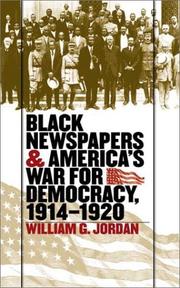| Listing 1 - 10 of 13 | << page >> |
Sort by
|
Book
ISBN: 1496215478 9781496215475 9781496215468 149621546X 9781496215451 1496215451 9780803299924 0803299923 Year: 2019 Publisher: Lincoln
Abstract | Keywords | Export | Availability | Bookmark
 Loading...
Loading...Choose an application
- Reference Manager
- EndNote
- RefWorks (Direct export to RefWorks)
African American newspapers --- African American celebrities --- African American press --- African American journalism --- Afro-American press --- Journalism, African American --- Negro press --- Press, African American --- African American mass media --- Ethnic press --- Celebrities, African American --- Celebrities --- Afro-American newspapers --- Negro newspapers (American) --- American newspapers --- Political aspects --- History --- Press coverage.
Book
ISBN: 0820349399 9780820349398 9780820349404 0820349402 0820349402 0820354694 Year: 2016 Publisher: Athens The University of Georgia Press
Abstract | Keywords | Export | Availability | Bookmark
 Loading...
Loading...Choose an application
- Reference Manager
- EndNote
- RefWorks (Direct export to RefWorks)
Press and politics --- African American newspapers --- African American press --- Politics and the press --- Press --- Advertising, Political --- Government and the press --- Journalism --- Afro-American newspapers --- Negro newspapers (American) --- American newspapers --- African American journalism --- Afro-American press --- Journalism, African American --- Negro press --- Press, African American --- African American mass media --- Ethnic press --- History --- Political aspects
Book
ISBN: 9780252050091 0252050096 9780252041495 9780252083037 0252083032 0252041496 Year: 2017 Publisher: Urbana
Abstract | Keywords | Export | Availability | Bookmark
 Loading...
Loading...Choose an application
- Reference Manager
- EndNote
- RefWorks (Direct export to RefWorks)
"Once distinct, the commercial and alternative black press began to cross over with one another in the 1920s. The porous press culture that emerged shifted the political and economic motivations shaping African American journalism. It also sparked disputes over radical politics that altered news coverage of some of the most momentous events in African American history. Starting in the 1920s, Fred Carroll traces how mainstream journalists incorporated coverage of the alternative press’s supposedly marginal politics of anticolonialism, anticapitalism, and black separatism into their publications. He follows the narrative into the 1950s, when an alternative press reemerged as commercial publishers curbed progressive journalism in the face of Cold War repression. Yet, as Carroll shows, journalists achieved significant editorial independence, and continued to do so as national newspapers modernized into the 1960s. Alternative writers’ politics seeped into commercial papers via journalists who wrote for both presses and through professional friendships that ignored political boundaries."
African American press --- Civil rights movements --- Civil liberation movements --- Liberation movements (Civil rights) --- Protest movements (Civil rights) --- Human rights movements --- African American journalism --- Afro-American press --- Journalism, African American --- Negro press --- Press, African American --- African American mass media --- Ethnic press --- History --- Press coverage
Book
ISBN: 9783030975012 Year: 2022 Publisher: Cham Springer International Publishing :Imprint: Palgrave Macmillan
Abstract | Keywords | Export | Availability | Bookmark
 Loading...
Loading...Choose an application
- Reference Manager
- EndNote
- RefWorks (Direct export to RefWorks)
African American press. --- African American journalism --- Afro-American press --- Journalism, African American --- Negro press --- Press, African American --- African American mass media --- Ethnic press --- Journalism --- African American universities and colleges --- Study and teaching (Higher) --- Accreditation --- Accreditation. --- Writing (Authorship) --- Literature --- Publicity --- Fake news
Book
ISBN: 1498566855 1498566871 1498566863 9781498566865 9781498566858 Year: 2018 Publisher: Lanham
Abstract | Keywords | Export | Availability | Bookmark
 Loading...
Loading...Choose an application
- Reference Manager
- EndNote
- RefWorks (Direct export to RefWorks)
African American press --- Tea Party movement --- History. --- Press coverage. --- United States --- Politics and government. --- Tea Baggers movement --- Teabaggers movement --- Populism --- Protest movements --- African American journalism --- Afro-American press --- Journalism, African American --- Negro press --- Press, African American --- African American mass media --- Ethnic press

ISBN: 0813801850 9780813801858 Year: 1972 Publisher: Ames (Iowa): Iowa state university press,
Abstract | Keywords | Export | Availability | Bookmark
 Loading...
Loading...Choose an application
- Reference Manager
- EndNote
- RefWorks (Direct export to RefWorks)
African American press. --- African American press --- African American newspapers --- African American journalists --- #SBIB:309H1813 --- African American journalism --- Afro-American press --- Journalism, African American --- Negro press --- Press, African American --- African American mass media --- Ethnic press --- Geschiedenis en/of organisatie van het perswezen: algemeen en per land (met inbegrip van de rol van het perswezen in de ontwikkelingsproblematiek) --- 070 --- 070 Pers. Nieuwsbladen. Magazines. Redaktie. Journalistiek--(algemeen) --- Pers. Nieuwsbladen. Magazines. Redaktie. Journalistiek--(algemeen) --- History --- Biography --- United States --- Race relations --- 19th century --- African Americans
Book
ISBN: 0826272592 9780826272591 9780826219398 082621939X Year: 2011 Publisher: Columbia [Mo.] London University of Missouri Press
Abstract | Keywords | Export | Availability | Bookmark
 Loading...
Loading...Choose an application
- Reference Manager
- EndNote
- RefWorks (Direct export to RefWorks)
During the Vietnam War, young African Americans fought to protect the freedoms of Southeast Asians and died in disproportionate numbers compared to their white counterparts. Despite their sacrifices, black Americans were unable to secure equal rights at home, and because the importance of the war overshadowed the civil rights movement in the minds of politicians and the public, it seemed that further progress might never come. For many African Americans, the bloodshed, loss, and disappointment of war became just another chapter in the history of the civil rights movement. Lawrence Allen Eldridge explores this two-front war, showing how the African American press grappled with the Vietnam War and its impact on the struggle for civil rights. This book is the first to examine coverage of the Vietnam War by black news publications, from the Gulf of Tonkin incident in August 1964 to the final withdrawal of American ground forces in the spring of 1973 and the fall of Saigon in the spring of 1975. Eldridge reveals how the black press not only reported the war but also weighed its significance in the context of the civil rights movement. In analyzing seventeen African American newspapers, the author examines not only the role of reporters during the war, but also those of editors, commentators, and cartoonists. Especially enlightening is the research drawn from extensive oral histories by prominent journalist Ethel Payne, the first African American woman to receive the title of war correspondent. She described a widespread practice in black papers of reworking material from major white papers without providing proper credit, as the demand for news swamped the small budgets and limited staffs of African American papers. The author analyzes both the strengths of the black print media and the weaknesses in their coverage. He augmented this study with a rich array of primary sources--including interviews with black journalists and editors, oral history collections, the personal papers of key figures in the black press, and government documents, including those from the presidential libraries of Lyndon Johnson, Richard Nixon, and Gerald Ford--to trace the ups and downs of U.S. domestic and wartime policy especially as it related to the impact of the war on civil rights. The black press ultimately viewed the Vietnam War through the lens of African American experience, blaming the war for crippling LBJ's Great Society and the War on Poverty. Despite its waning hopes for an improved life, the black press soldiered on.
Vietnam War, 1961-1975 --- Civil rights movements --- African Americans --- African American press --- Vietnam Conflict, 1961-1975 --- Vietnamese Conflict, 1961-1975 --- Vietnamese War, 1961-1975 --- African American journalism --- Afro-American press --- Journalism, African American --- Negro press --- Press, African American --- African American mass media --- Ethnic press --- Public opinion. --- History --- Civil rights --- African Americans. --- Press coverage --- Geschichte 1955-1975. --- United States --- Race relations --- Armed Forces --- Afro-Americans --- Negroes

ISBN: 080787552X 9780807875520 9780807826225 0807826227 9780807849361 0807849367 9798890867872 Year: 2001 Publisher: Chapel Hill
Abstract | Keywords | Export | Availability | Bookmark
 Loading...
Loading...Choose an application
- Reference Manager
- EndNote
- RefWorks (Direct export to RefWorks)
Explains how the black press enlisted public support for racial justice during World War I. A delicate balance was achieved between affirming patriotism and supporting President Wilson's war for democracy and demanding the government take steps to stop lynching, segregation and disenfranchisement.
African American press --- African American newspapers --- World War, 1914-1918 --- Afro-American newspapers --- Negro newspapers (American) --- American newspapers --- African American journalism --- Afro-American press --- Journalism, African American --- Negro press --- Press, African American --- African American mass media --- Ethnic press --- European War, 1914-1918 --- First World War, 1914-1918 --- Great War, 1914-1918 --- World War 1, 1914-1918 --- World War I, 1914-1918 --- World War One, 1914-1918 --- WW I (World War, 1914-1918) --- WWI (World War, 1914-1918) --- History, Modern --- History --- Press coverage
Book
ISBN: 0739195638 0739190776 9780739190777 9780739190760 0739190768 9781306697156 1306697158 Year: 2014 Publisher: Lanham
Abstract | Keywords | Export | Availability | Bookmark
 Loading...
Loading...Choose an application
- Reference Manager
- EndNote
- RefWorks (Direct export to RefWorks)
The African American Press in World War II: Toward Victory at Home and Abroad thoroughly explores the diverse nature of the wartime African American press at home and its groundbreaking coverage of international. This effort enhanced the black press's influence, increased interest in the press in general, and greatly improved circulation figures.
World War, 1939-1945 --- African American press --- African American journalism --- Afro-American press --- Journalism, African American --- Negro press --- Press, African American --- African American mass media --- Ethnic press --- European War, 1939-1945 --- Second World War, 1939-1945 --- World War 2, 1939-1945 --- World War II, 1939-1945 --- World War Two, 1939-1945 --- WW II (World War, 1939-1945) --- WWII (World War, 1939-1945) --- History, Modern --- Press coverage --- History --- African Americans. --- Afro-Americans --- Negroes

ISBN: 0511007639 0511813546 0511149050 0511052243 9780511007637 0521651247 9780521651240 0521658411 9780521658416 0511007655 9780511007651 9780511813542 0511549350 0521564158 052156462X 9780511149054 9780511052248 Year: 1999 Volume: [121] Publisher: Cambridge Cambridge University Press
Abstract | Keywords | Export | Availability | Bookmark
 Loading...
Loading...Choose an application
- Reference Manager
- EndNote
- RefWorks (Direct export to RefWorks)
This text presents a rigorous mathematical account of the principles of quantum mechanics, in particular as applied to chemistry and chemical physics. Applications are used as illustrations of the basic theory. The first two chapters serve as an introduction to quantum theory, although it is assumed that the reader has been exposed to elementary quantum mechanics as part of an undergraduate physical chemistry or atomic physics course. Following a discussion of wave motion leading to Schrödinger's wave mechanics, the postulates of quantum mechanics are presented along with essential mathematical concepts and techniques. The postulates are rigorously applied to the harmonic oscillator, angular momentum, the hydrogen atom, the variation method, perturbation theory, and nuclear motion. Modern theoretical concepts such as hermitian operators, Hilbert space, Dirac notation, and ladder operators are introduced and used throughout. This text is appropriate for beginning graduate students in chemistry, chemical physics, molecular physics and materials science.
Quantum chemistry. --- Chemistry, Quantum --- Chemistry, Physical and theoretical --- Quantum theory --- Excited state chemistry --- American literature --- Rhetoric --- English language --- African Americans --- African Americans in literature. --- Public opinion --- Journalism --- African American press. --- African American journalism --- Afro-American press --- Journalism, African American --- Negro press --- Press, African American --- African American mass media --- Ethnic press --- New journalism --- Afro-Americans in literature --- Negroes in literature --- African American intellectuals --- Language and languages --- Speaking --- Authorship --- Expression --- Literary style --- African American authors --- History and criticism. --- Political aspects --- Rhetoric. --- Social aspects --- Intellectual life. --- Communication. --- Quantum mechanics. Quantumfield theory --- Arts and Humanities --- Literature --- Germanic languages --- Quantum chemistry
| Listing 1 - 10 of 13 | << page >> |
Sort by
|

 Search
Search Feedback
Feedback About UniCat
About UniCat  Help
Help News
News